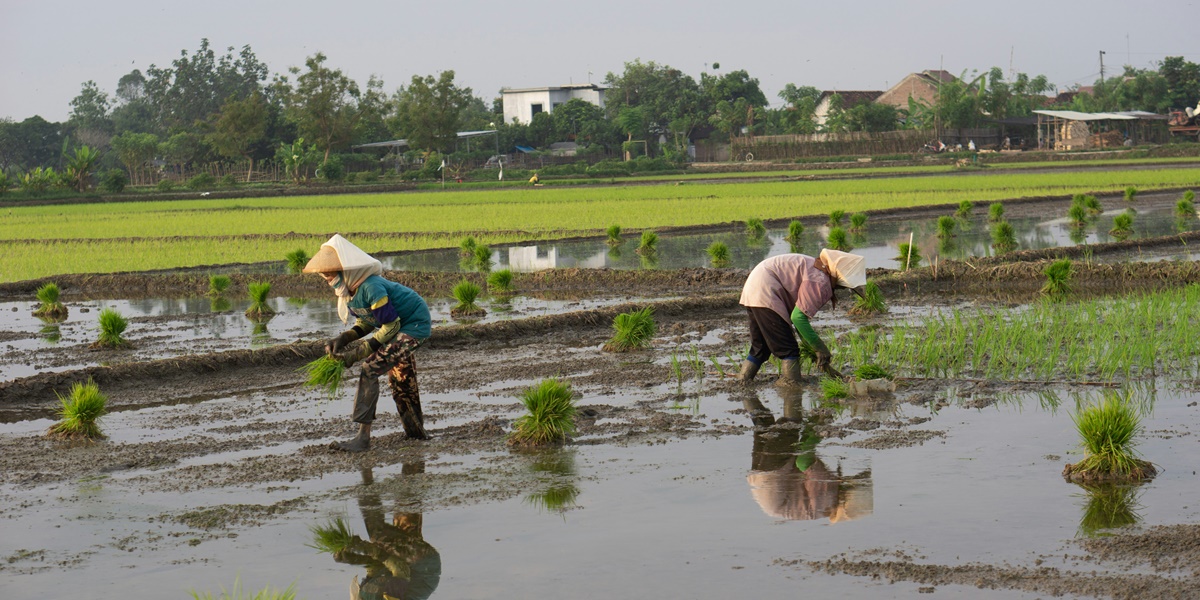A Good Day for Traveling According to Javanese Primbon, Can Be a Travel Guide Based on Tradition
What days are considered good for traveling in Javanese primbon? To find out the explanation of good days for traveling according to Javanese primbon.

Kapanlagi.com - In traditional Javanese culture, it is believed that there are good days for planting rice. For traditional farmers who still believe in this, it is considered one of the important factors influencing harvest success. Even today, many people are trying to learn the methods of calculating good days for planting rice according to Javanese primbon.
The calculation of good days for planting rice according to Javanese primbon is one of the traditions and cultures. In Javanese primbon, there is a deep understanding of the calculation of good days for planting rice. For farmers who still uphold the tradition, combining the calculation of good days for planting rice is believed to be an effort to optimize harvest results with a spiritual approach.
So, what is the explanation of good days for planting rice according to Javanese primbon? To find out, let's directly look at the following review.

The Weton Neptu concept for calculating good days for planting rice (credit: unsplash)
In the calculation of good days for planting rice according to Javanese primbon, the concept of weton neptu plays an important role. Therefore, to understand the method of calculating good days for planting rice, one must first understand what weton and neptu are.
Weton is a combination of the day (dina) and the market in the Javanese calendar. Each day and market has its own numerical value or 'neptu'. Neptu is obtained by adding the numerical value or neptu of a certain day (Monday, Tuesday, Wednesday, Thursday, Friday, Saturday, and Sunday) with the Javanese markets (Legi, Pahing, Pon, Wage, and Kliwon).
For clarity, here are the neptu values for days and markets:
Values of Birth Days
- Value of Sunday: 5
- Value of Monday: 4
- Value of Tuesday: 3
- Value of Wednesday: 7
- Value of Thursday: 8
- Value of Friday: 6
- Value of Saturday: 9
Values of Javanese Markets
- Value of Javanese Market Kliwon: 8
- Value of Javanese Market Legi: 5
- Value of Javanese Market Pahing: 9
- Value of Javanese Market Pon: 7
- Value of Javanese Market Wage: 4

How to Calculate Good Days for Planting Rice According to Javanese Primbon (credit: unsplash)
The way to calculate good days for planting rice according to Javanese primbon can be learned easily as long as one is meticulous. Calculating good days for planting rice according to primbon is done by performing simple calculations.
In the calculation of good days for planting rice according to Javanese primbon, ordinary days are divided into 4 categories: 1 Oyod (root), 2 wit (tree/stem), 3 godhong (leaf), 4 woh (fruit).
The first category of days, oyod or root, is considered suitable for planting crops like tubers that are harvested for their roots. The second category, wit or stem/tree, is suitable for planting crops that are harvested from the tree or stem. The third category, godhong or leaf, is suitable for planting crops that are harvested for their leaves. Lastly, the category of woh or fruit is suitable for crops that are harvested for their fruits.
Based on the above division, rice falls into the woh or fruit category. Therefore, the good days for planting rice according to Javanese primbon are the days that fall into the fourth category or fruit days.
Now, to determine whether a day falls into category 1, 2, 3, or 4, the method is very easy. To do this, a farmer must know the neptu of the day planned for planting rice.
After that, the neptu of the chosen day is divided by the number 4. In the end, the remainder from that division can indicate whether the chosen day falls into category 1 (oyod), 2 (wit), 3 (godhong), or 4 (woh).
For example:
When planning to plant rice on Saturday Pon with a neptu of 16, the calculation is 16:4 = 4 (including woh). This means that Saturday Pon is considered a good day for planting rice according to Javanese primbon.

Benefits of Knowing Good Days for Planting Rice According to Primbon (credit: unsplash)
As mentioned at the beginning, knowing the count of good days for planting rice according to Javanese primbon is important. For traditional farming communities that believe, knowing the good days for planting rice according to Javanese primbon can bring various benefits.
Here are some benefits of knowing good days for planting rice according to Javanese primbon.
1. Efforts to Align with Natural Energy
Javanese primbon believes that there are certain days when natural energy is more supportive for plant growth.
2. Increasing Luck
Some farmers believe that planting on the right day can reduce the risk of crop failure due to unexpected factors.
3. Boosting Confidence and Spirit
By planting on a day considered good, farmers feel more confident and enthusiastic in starting the planting season.
4. Preserving Tradition
Following the count of good days for planting rice according to Javanese primbon helps preserve local wisdom and traditional knowledge.
5. Enhancing Community Solidarity
This practice often becomes a communal activity that strengthens social bonds among farmers.
That’s a brief overview of how to count good days for planting rice according to Javanese primbon. However, it is important to remember that the count of auspicious days for planting rice according to Javanese primbon is not the only factor that determines the success of the harvest.
In addition, other factors such as soil quality, weather, planting techniques, and plant care are also very important. So, the final decision to believe or not to believe is left to the reader.
(kpl/psp)
Cobain For You Page (FYP) Yang kamu suka ada di sini,
lihat isinya
What days are considered good for traveling in Javanese primbon? To find out the explanation of good days for traveling according to Javanese primbon.
Curious about the synopsis of the Japanese drama about the racer ENGINE? To find out, just check out the following review.
Let’s take a look together at how this INFP MBTI type, Choi Woo Shik, can be the key to his success in the Korean entertainment industry. Check it out, KLovers!
Let's take a closer look at how this ESTJ character becomes the key to Ryu Jun Yeol's success. KLovers who like this oppa, just check out the following article. Just check it out, KLovers!
For those curious about the story, here is the complete synopsis of the film GREENLAND from 2020 along with the names of the cast. Let's check it out, KLovers!
For those of you who want to learn, here are expressions of Japanese airport language complete with example sentences and other common vocabulary. Come on, let's check it out KLovers!
Curious about the explanation of the meaning of dreaming of seeing someone wearing white according to Islam? To find out, just take a look at the following review.
Curious about what the explanation is for dreaming about seeing a small monkey? To find out, just check out the following review.
So, what is the explanation of the character of people born on Tuesday according to Javanese primbon? To find out, let's directly look at the following review.
Among the various platforms offering the MBTI test, 16personalities.com is one of the most favored. It is evident that many people try the MBTI test on the 16personalities site.
So, what is the explanation of the character of people born on Friday according to Javanese primbon? To find out, let's take a look at the following review.
Many people are curious about the unique MBTI types of STRANGER THINGS characters. By understanding the MBTI type of each character, fans can gain more insight into the motivations and behaviors of their favorite characters in STRANGER THINGS.